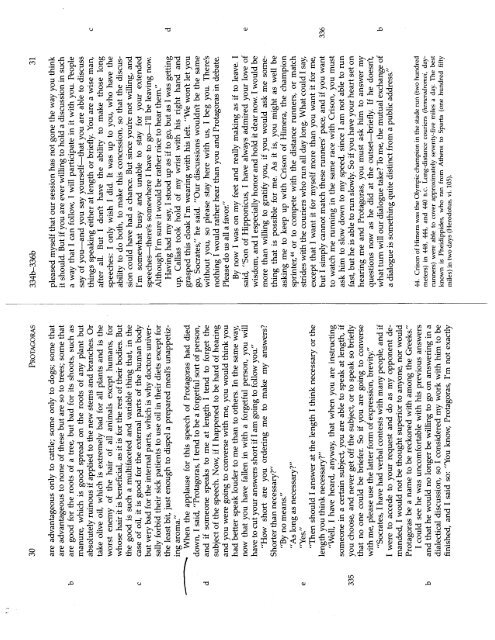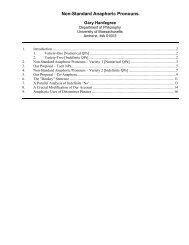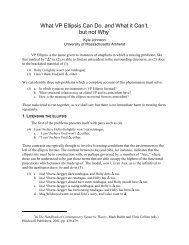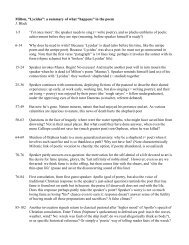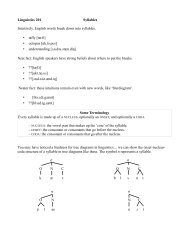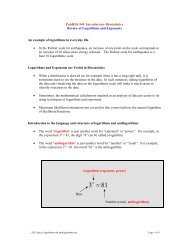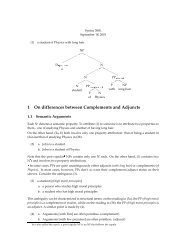Protagoras (PDF)
Protagoras (PDF)
Protagoras (PDF)
Create successful ePaper yourself
Turn your PDF publications into a flip-book with our unique Google optimized e-Paper software.
30 PRoTAGols 334b—336b 31<br />
are advantageous only to cattle; some only to dogs; some that<br />
are advantageous to none of these but are so to trees; some that<br />
b are good for the roots of a tree, but bad for its shoots, such as<br />
manure, which is good spread on the roots of any plant but<br />
absolutely ruinous if applied to the new stems and branches. Or<br />
take olive oil, which is extremely bad for all plants and is the<br />
worst enemy of the hair of all animals except humans, for<br />
whose hair it is beneficial, as it is for the rest of their bodies. But<br />
the good is such a multifaceted and variable thing that, in the<br />
c case of oil, it is good for the external parts of the human body<br />
but very bad for the internal parts, which is why doctors univer<br />
sally forbid their sick patients to use oil in their diets except for<br />
the least bit, just enough to dispel a prepared meal’s unappetiz<br />
ing aroma.”<br />
When the applause for this speech of <strong>Protagoras</strong> had died<br />
down, I said, “<strong>Protagoras</strong>, I tend to be a forgetful sort of person,<br />
d and if someone speaks to me at length I tend to forget the<br />
subject of the speech. Now, if I happened to be hard of hearing<br />
and you were going to converse with me, you would think you<br />
had better speak louder to me than to others. In the same way,<br />
now that you have fallen in with a forgetful person, you will<br />
have to cut your answers short if I am going to follow you.”<br />
“How short are you ordering me to make my answers?<br />
Shorter than necessary?”<br />
“By no means.”<br />
“As long as necessary?”<br />
e “Yes.”<br />
“Then should I answer at the length I think necessary or the<br />
length you think necessary?”<br />
“Well, I have heard, anyway, that when you are instructing<br />
someone in a certain subject, you are able to speak at length, if<br />
335 you choose, and never get off the subject, or to speak so briefly<br />
that no one could be briefer. So if you are going to converse<br />
with me, please use the latter form of expression, brevity.”<br />
“Socrates, I have had verbal contests with many people, and if<br />
I were to accede to your request and do as my opponent de<br />
manded, I would not be thought superior to anyone, nor would<br />
<strong>Protagoras</strong> be a name to be reckoned with among the Greeks.”<br />
I could see he was uncomfortable with his previous answers<br />
b and that he would no longer be willing to go on answering in a<br />
dialectical discussion, so I considered my work with him to be<br />
finished, and I said so: “You know, <strong>Protagoras</strong>, I’m not exactly<br />
pleased myself that our session has not gone the way you think<br />
it should. But if you are ever willing to hold a discussion in such<br />
a way that I can follow, I will participate in it with you. People<br />
say of you—and you say yourself—that you are able to discuss<br />
things speaking either at length or briefly. You are a wise man,<br />
after all. But I don’t have the ability to make those long<br />
speeches: I only wish I did. It was up to you, who have the<br />
ability to do both, to make this concession, so that the discus<br />
sion could have had a chance. But since youre not willing, and<br />
I’m somewhat busy and unable to stay for your extended<br />
speeches—there’s somewhere I have to go—I’ll be leaving now.<br />
Although I’m sure it would be rather nice to hear them.”<br />
Having had my say, I stood up as if to go, but as I was getting<br />
up, Callias took hold of my wrist with his right hand and<br />
grasped this cloak I’m wearing with his left. “We won’t let you<br />
go, Socrates,” he said. “Our discussions wouldn’t be the same<br />
without you, so please stay here with us, I beg you. There’s<br />
nothing I would rather hear than you and <strong>Protagoras</strong> in debate.<br />
Please do us all a favor.”<br />
By now I was on my feet and really making as if to leave. I<br />
said, “Son of Hipponicus, I have always admired your love of<br />
wisdom, and I especially honor and hold it dear now. I would be<br />
more than willing to gratify you, if you would ask me some<br />
thing that is possible for me. As it is, you might as well be<br />
asking me to keep up with Crison of Himera, the champion<br />
sprinter, 44 or to compete with the distance runners, or match<br />
strides with the couriers who run all day long. What could I say,<br />
except that I want it for myself more than you want it for me,<br />
but I simply cannot match these runners’ pace, and if you want<br />
to watch me running in the same race with Crison, you must<br />
ask him to slow down to my speed, since I am not able to run<br />
fast, but he is able to run slowly. So if you have your heart set on<br />
hearing me and <strong>Protagoras</strong>, you must ask him to answer my<br />
questions now as he did at the outset—briefly. If he doesn’t,<br />
what turn will our dialogue take? To me, the mutual exchange of<br />
a dialogue is something quite distinct from a public address.”<br />
44. Crison of Himera was the Olympic champion in the stade run (two hundred<br />
meters) in 448, 444, and 440 B.C. Long-distance couriers (hetnerodromoi, dayrunners)<br />
were able to cover approximately seventy-five miles a day. The best<br />
known is Pheidippides, who ran from Athens to Sparta (one hundred fifty<br />
miles) in two days (Herodotus, vi. 105).<br />
d<br />
e<br />
336<br />
b


